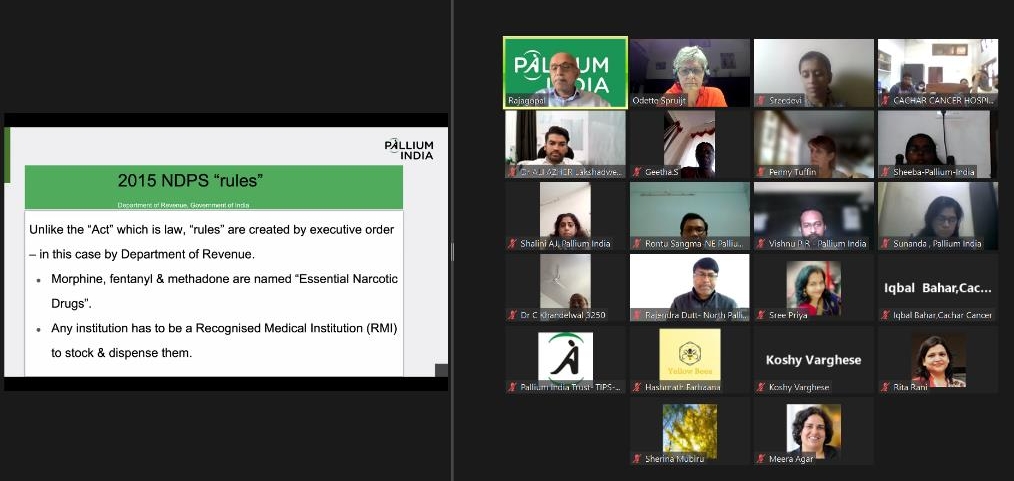ECHO Hamrahi session

Dr Odette Spruijt, Founder & Chair of Australasian Palliative Link International (APLI) writes:
On 8th February, 2022, Australasian Palliative Link International (APLI) and Trivandrum Institute of Palliative Sciences (TIPS) held their third ECHO Hamrahi session. The topic was Opioid availability in India with Dr Rajagopal, Pallium India as key speaker, followed by three speakers from across India, Drs Ali Azher (Thanal, Lakshadweep), Rita Rani (Mahavir Cancer Sansthan, Patna, Bihar) and Iqbal Bahar (Cachar Cancer Centre, Silchar, Assam).
There were 22 participants, including Pallium India’s State Facilitation regional coordinators across India. After a review of the 2014 Amended NDPS law and related 2015 rules, there was discussion about why there were still so many districts across India which were still following the pre-2014 NDPS rules, despite it now being against the law to do so. Clinicians shared their struggles to obtain oral morphine for patients to continue outside the institutional walls and the push back they encountered from regulatory authorities and, sadly, from colleagues who were poorly informed about safe opioid prescribing and management of severe cancer pain.
All three regional presenters were working in Registered Medical Institutions (RMIs) which were providing a continuous supply of oral and injectable opioids for their patients. Cachar Cancer Centre has had no interruption in supply for over three years. Thanal Lakshadweep has been established as an RMI since 2013 and is working to obtain direct supply of opioids rather than having to order via Kerala with all the resulting delays, often over three months. Advice was to order much longer supply to avoid stockouts and shortages, while also working toward establishing a more reliable supply chain.
For Bihar, we were all disturbed to hear that there are only two out of the 38 districts with RMIs and so the capacity to ensure that a supply of oral opioids is available to their patients. This translates to an enormous burden of unrelieved suffering. The population of Bihar is estimated at 127 million by 2020, the third largest state by population in India. The major care providers for palliative care are centered in Patna at Indira Gandhi Institute of Medical Sciences (IGIMS), Mahavir Cancer Sansthan, AIIMS Patna, and the Homi Bhabha Cancer Hospital and Research centre (HBCHRC), Muzaffarpur.
Many institutions are still operating according to the pre 2014 Amended NDPS, effectively operating against the law in doing so. This was disappointing. I was personally present at a state-wide workshop held at IGIMS in 2018, co-conducted by the Pallium India, with Dr Rajagopal as keynote speaker. This was attended by the State of Bihar Drug Controller and clinicians from many hospitals in Patna and beyond. The change in the national law was clearly laid out and its implementation discussed in detail. However, despite the passage of 3 years, the situation remains largely unchanged with only four RMIs across the entire state.
However, progress at Mahavir Cancer Sansthan inspired us all. As well as establishing a palliative care team, ward, outpatient clinic and emergency palliative care area, MCS is working toward opening a large hospice centre, with 100 beds, to cater to the needs of the many patients who present with advanced, incurable cancer to that institution. This would be a very significant addition to the care of patients with cancer in Bihar. They have also run many IAPC sensitization courses for volunteers, and End of life nursing education consortium (ELNEC) course for nurses.
Challenges are many. For example, most doctors avoid prescribing oral morphine for fear of side effects and she estimates that 95% of cancer patients in Bihar have poorly managed pain. Dr Rita shared that many times her patients’ opioid management is ceased by other practitioners who put them back onto tramadol resulting in recurrence of severe pain. However, despite this, oral morphine 10mg tablet use at MCS has more than doubled since 2017, now up to 98254 tablets. So there is great cause for optimism that the care of people with severe cancer pain in Bihar will significantly improve thanks to the work of Dr Rani and her team.






